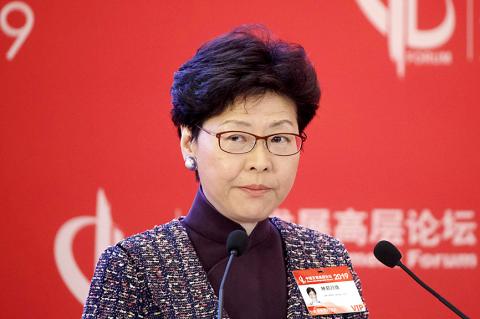China on Wednesday condemned a British report that expressed concern over eroding freedoms in Hong Kong, accusing Britian of having “ignored and distorted the truth” about the territory.
Former British colony Hong Kong enjoys rights unseen on the Chinese mainland, including freedom of expression, which are protected in the handover agreement between China and Britain, but in recent years concern has grown in Hong Kong and abroad about its freedoms disappearing as Beijing tightens its grip on the territory.
In a report on Wednesday, British Secretary of State for Foreign and Commonwealth Affairs Jeremy Hunt said he was “concerned that on civil and political freedoms, Hong Kong’s high degree of autonomy is being reduced.”

Photo: Reuters
Hunt cited recent moves by Hong Kong authorities, including banning a pro-independence party, screening political candidates and barring a Financial Times journalist who chaired a talk by an independence activist.
He described “recent pressure being applied on Hong Kong to move towards a mainland Chinese interpretation of civil and political freedoms, under which certain subjects are effectively off-limits for discussion and debate.”
In response, the Chinese Ministry of Foreign Affairs urged Britain to “stop interfering in China’s internal affairs,” state media reported.
A spokesperson for the ministry in Hong Kong said the “so-called report ... ignored and distorted the truth by deliberately confusing the legitimate and lawful measures taken” to fight pro-independence forces and protect national security, Xinhua news agency reported.
Hong Kong Chief Executive Carrie Lam (林鄭月娥) has previously criticized Britain’s six-monthly reports, noting they still continue “despite the unification.”
British activist Benedict Rogers said it was “the first time that the [British] Foreign and Commonwealth Office has publicly stated so clearly and strongly in a six-monthly report that not all aspects of ‘one country, two systems’ are functioning well.”
The report “reflects a serious deterioration of the situation on the ground,” Rogers said.

MAKING WAVES: China’s maritime militia could become a nontraditional threat in war, clogging up shipping lanes to prevent US or Japanese intervention, a report said About 1,900 Chinese ships flying flags of convenience and fishing vessels that participated in China’s military exercises around Taiwan last month and in January last year have been listed for monitoring, Coast Guard Administration (CGA) Deputy Director-General Hsieh Ching-chin (謝慶欽) said yesterday. Following amendments to the Commercial Port Act (商港法) and the Law of Ships (船舶法) last month, the CGA can designate possible berthing areas or deny ports of call for vessels suspected of loitering around areas where undersea cables can be accessed, Oceans Affairs Council Minister Kuan Bi-ling (管碧玲) said. The list of suspected ships, originally 300, had risen to about

DAREDEVIL: Honnold said it had always been a dream of his to climb Taipei 101, while a Netflix producer said the skyscraper was ‘a real icon of this country’ US climber Alex Honnold yesterday took on Taiwan’s tallest building, becoming the first person to scale Taipei 101 without a rope, harness or safety net. Hundreds of spectators gathered at the base of the 101-story skyscraper to watch Honnold, 40, embark on his daredevil feat, which was also broadcast live on Netflix. Dressed in a red T-shirt and yellow custom-made climbing shoes, Honnold swiftly moved up the southeast face of the glass and steel building. At one point, he stepped onto a platform midway up to wave down at fans and onlookers who were taking photos. People watching from inside

Japan’s strategic alliance with the US would collapse if Tokyo were to turn away from a conflict in Taiwan, Japanese Prime Minister Sanae Takaichi said yesterday, but distanced herself from previous comments that suggested a possible military response in such an event. Takaichi expressed her latest views on a nationally broadcast TV program late on Monday, where an opposition party leader criticized her for igniting tensions with China with the earlier remarks. Ties between Japan and China have sunk to the worst level in years after Takaichi said in November that a hypothetical Chinese attack on Taiwan could bring about a Japanese

The WHO ignored early COVID-19 warnings from Taiwan, US Deputy Secretary of Health and Human Services Jim O’Neill said on Friday, as part of justification for Washington withdrawing from the global health body. US Secretary of State Marco Rubio on Thursday said that the US was pulling out of the UN agency, as it failed to fulfill its responsibilities during the COVID-19 pandemic. The WHO “ignored early COVID warnings from Taiwan in 2019 by pretending Taiwan did not exist, O’Neill wrote on X on Friday, Taiwan time. “It ignored rigorous science and promoted lockdowns.” The US will “continue international coordination on infectious